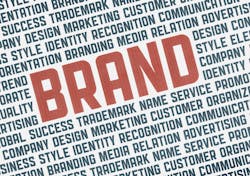When it comes to creating a brand for your residential plumbing or heating home services business, it can be confusing. What is a brand, exactly? And is it the same as marketing
Investopedia.com (www.investopedia.com/terms/b/brand.asp) notes that “people often confuse brands with things [such as] logos, slogans or other recognizable marks. While these terms are often used interchangeably, they are distinct. The former are marketing tools that companies often use to promote and market their products and services. When used together, these tools create a brand identity.”
So, a brand is part of a marketing strategy.
“Marketing can mean so many different things, and there's so many tactics when it comes to it,” explains Rebecca Cassel, managing partner of CertainPath (the former Success Group International). “But if you build a brand, it will help all those marketing tactics you utilize.”
Marketing tactics differ from company to company, depending on a variety of conditions. However, “a brand is considered to be one of the most valuable and important assets for a company,” Investopedia.com says. “A good brand engenders trust in the consumer.”
After having a good experience with one service, the consumer is more likely to try another service from the same brand or company.
Cassel agrees: “Branding is owning the mind of the customer in your marketplace. It's the process of creating a strong, positive perception of the services and the products you offer. For example, if I ask, ‘Can you name a heating and air conditioning company?’ If I've really built a brand, I would hope to be in the top three of those I ask.”
She explains three advantageous reasons for residential home services businesses to consider branding.
1. Recall. “If you’ve built your brand, the idea is people won’t go to their phone and Google for a residential contractor; they’ll look for your number,” Cassel says. “The point of branding is to facilitate an unaided recall of your company. So when a homeowner has a problem, she reflexively knows to call you.”
2. Labor. “Building your brand also helps you attract top talent,” she notes. “That’s everyone’s biggest challenge in the trades today. People want to work for companies that are perceived positively in the marketplace.”
3. Loyalty. “When all you have is a positive perception of a company, it increases how often your customers refer you to their friends and mention you in conversation,” she says.
However, it’s important to ensure you have a strong foundation of operational and customer service excellence before you spend a significant amount of money crafting a branding message. An outstanding reputation will bring new techs and customers to your door. You’ll need that foundation once your branding strategy takes off, Cassel says.
“I began in this industry when a great Yellow Page ad was all you needed to get your phone to ring,” she explains. “Today, the Internet has made marketing and branding more complicated. You need to seek out expertise, whether you have a business coach or a network of contractors to use as a sounding board. As an entrepreneur, it’s invaluable to have mentors and friends to walk alongside you.”
Define Your Message
The first step in building a brand is defining your company—what is its story? How do you want your company viewed? This is your brand identity.
“How are you different than everybody else? Is there a position in the marketplace you can own?” Cassel asks. “Most great brands are known for something. Whether it's a pricing advantage, a product advantage or a service advantage, there needs to be some type of differentiation for your brand to stand out. Then it must be explained in a very simple, succinct way.”
What message do you want to convey? Message is important, she adds, especially if your company name is your family’s surname.
“You need a great name,” Cassel explains. “If you were not blessed with an amazing last name, your message must communicate who you are and what you stand for; it must be incredibly strong.”
However, it’s not necessary to change a company’s family name into catchy name—especially if you’ve been serving customers for a long time under that name. It may confuse those longtime customers who have always called you; they may not trust a company that changes its name.
A logo may help to incorporate the right message. “A company that can get its message across is able to induce and evoke emotion within its customer base,” Investopedia says.
Put some thought into your logo, Cassel says; it should be simple and easy to understand. “Think of some iconic brands today: Nike, Mercedes, Lexus,” she explains. “Their logos are very simple; yet everyone knows them.”
Simple. Legible. Clean. Clear message. These are elements of a strong logo, Cassel notes. And they should be elements of your moving billboards: your service trucks.
“Too often, we see contractors’ trucks with 50 different emblems, pictures, services and multiple numbers,” she notes. “It makes them too busy. Simple is good. Color is very important—own a color that’s unlike anything in your marketplace. Be different, but don’t be cluttered.”
A great name, insightful message and colorful yet simple logo—these are the elements of brand awareness in your customer base. Once you’ve established them, make them part of all your marketing materials. “They are your brand standards and should be consistent in every piece of marketing you do, beginning with your trucks,” Cassel says.
Be Recognized
Consistency in your brand is important. Making changes every year just to be “new” may make it difficult for customers to find you. “Once you properly construct your brand, leave it alone.” Cassel reiterates. “It takes a long time for much of your market to learn who you are. Change doesn’t help that.”
What’s next? This is when you start marketing your brand, getting it in front of people. Digital tools such as pay per click and search engine optimization have their place in the marketing mix, she says, but TV and radio are still the most effective methods today of promoting a brand.
“Consistency in those mediums is critical, they help build mindshare,” Cassel explains. “I highly recommend you work with an agency to build the proper broadcast ads and schedule, not someone working for the station. Yes, it’s expensive, but it's an investment that will lead to exponential returns if built properly. At the very least, find another experienced, successful contractor who is willing to give you some advice.”
She adds: “Too many contractors fall victim of saying yes to every TV or radio rep who calls us with a great deal on 97 spots. Well, if those 97 spots are only played at 3 a.m., they’re worthless. You get what you pay for. Having someone who can walk you through the marketing planning process is invaluable.”
However, marketing is only one component of a successful brand. “For marketing to be effective, you must deliver excellent service, get great reviews and earn referrals,” Cassel notes. “With the Internet, you can’t spend your way around a bad reputation.”
Training is critical, she adds, to become operationally excellent and take “extraordinary care” of your team, your customers and your business.
Great brands allow you to define who you are in the marketplace. “Once you’ve built your brand, when people hear your name, it elicits an immediate, positive response,” Cassel says. “When they need plumbing work or their air conditioning fixed, they don’t need to ask a friend for a name. They know to call you.”
Getting your message across to the right customers can “induce and evoke emotion,” Investopedia notes. Building trust and credibility breeds loyalty, giving your business a competitive advantage in your market(s). So its important to do the research, reach out to other contractors or hire an agency to ensure the success of your brand.
“The day you went into business, you had a brand,” Cassel explains. “If you don't like it, or you feel like it's not resonating with the marketplace, you can rethink it. You can change your brand at any time—it’s never too late.”
Kelly Faloon is a contributing writer to Contractor magazine and principal of Faloon Editorial Services. The former editor of Plumbing & Mechanical magazine, she has more than 20 years of experience in the plumbing and heating industry and more than 30 years in B2B publishing. Faloon is a journalism graduate of Michigan State University.
About the Author

Kelly L. Faloon
Freelance Writer/Editor
Kelly L. Faloon is a contributing editor and writer to CONTRACTOR, Contracting Business magazine and HPAC Engineering and principal of Faloon Editorial Services. The former editor of Plumbing & Mechanical magazine, Faloon has more than 26 years of experience in the plumbing and heating industry and more than 35 years in B2B publishing. She started a freelance writing and editing business in 2017, where she has a varied clientele.
Faloon spent 3 1/2 years at Supply House Times before joining the Plumbing & Mechanical staff in 2001. Previously, she spent nearly 10 years at CCH/Wolters Kluwer, a publishing firm specializing in business and tax law, where she wore many hats — proofreader, writer/editor for a daily tax publication, and Internal Revenue Code editor.
A native of Michigan’s northern Lower Peninsula, Faloon is a journalism graduate of Michigan State University. You can reach her at [email protected].
